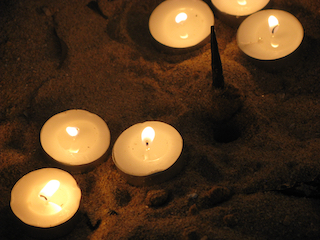The Luminosity of Darkness and Wonder: Part One

Photo by Brant Huddleston
The Luminosity of Darkness and Wonder: Part One
A favorite story of mine is from the summer of 1975, a few weeks after I was “born again” as a Christian. I was 19 years old. Back then I had quite a collection of vinyl records ~ The Rolling Stones, The Beatles, Santana, Hendrix, Cream…all the great classics of rock.
But the youth pastor who “led me to the Lord” declared rock music to be from the devil and that it should be destroyed. So he placed a 55-gallon drum in the church parking lot, and on a hot Saturday afternoon, all the youth brought their condemned records there and burned them.
All except me.
I kept my records and still have them to this day, evidence that, even then, I would not allow another person to do my thinking for me. I was then and am now the final arbiter of how to live my life. To do anything else is to forfeit one’s freedom and live in a box, and I believe God wants us to be free.
We’ve all heard the expression, “Don’t put God in a box,” and yet after over 40 years of life in the Christian church, I am amazed at how readily we all do it. I suspect it is because the idea of the infinite is just too incomprehensible, too vast, and it scares us. We run from the freedom and choose instead a life of boxes, of identity, of belonging.
There is no harm in such identification until we drag God into our box, a prospect that would be downright laughable if it did not so often result in hatred, division, and bloodshed. I recently finished a study of the so-called Byzantine Empire, one that ruled the civilized world for over a thousand years between the 4th and 16th centuries, all of it under the banner of Christ. Ferocious battles were fought during that time, sword to axe, brother against brother, with hundreds of thousands violently slain, all over the issue of whether to allow icons (images of God) into the faith or to keep them out (iconoclastism). Petty? Not to the Byzantines, the Roman Catholics, or to modern-day Muslims for that matter. Each side has its box and is willing to die for it.
There is a word, filioque (Latin for “and (from) the Son”) that was a casus belli for many an ancient battle. Since 1054 AD, that single word, found in one version of the Nicene Creed, has been the primary cause of schism between the Western and Eastern Orthodox churches. The Eastern leave the word out and the Western put it in. Then they fight about it…for centuries. How sad. Boxes.
I have long given up fighting ideologues and today debate them only in moments of weakness, a sick sport of sorts, knowing that I will never “win.” Scratch the surface of any ideologue, whether religious, political or otherwise, and underneath you will find a fearful person, who cannot be won, for that fear is both their protective bunker and their prison.
The great Christian mystic Eckhart Tolle observed that “the idea of God can become the final obstacle to God.” My ideas about God, and theirs are ultimately worthless and impediments to our spiritual journey. As Joseph Campbell aptly said, “Religion is an inoculation against the mystery.” There is no way the human imagination can fathom the ultimate, and the only way to catch a glimpse of it is by vanquishing one’s fear of the unknown.
But religious ideologues do the opposite ~ they fuel their fear with perceived threats to their dogma, ideology, and culture. They must stoke the fire of their belief so it burns hot and bright, that it may keep away the bogymen of mystery and the darkness of the unknown.
But there is light and freedom in the darkness. As the author Sam Keene said:
The spiritual mind is always metaphorical. Spiritual thinking is poetic thinking. It’s always trying to put a very diaphanous experience into words, realizing all the while that words are inadequate.
So if you have an idea of God you think is adequate, it’s not. I think we have to trust ourselves in the darkness of not knowing. The God out of which we came and into which we go is an unknown God.
It’s the luminosity of that darkness and that unknowing that is, I think, the most human — and the most sacred — place of all.
***
Continue reading in Part Two:
Books by Brant
Most Recent
For Christmas 2018, my brother, a pilot with American Airlines, gave me a gift that became the experience of a lifetime: 12 months of free travel anywhere American Airlines flies.
Thus began a year long journey that took me from the rocky coasts of Portugal, to the hot sands of Morocco, to the mangrove swamps of Panama, with many places beyond and between. In cheap hostels and the backwaters of the nomadic milieu, I discovered a treasure chest of colorful and fascinating people. I tell their stories and a bit of my own.
The trip became as much a spiritual and emotional journey inward as it was a literal outward one, and found me in a place those of you who are in the second half of life are likely to recognize.
With references to the philosophies of Carl Gustav Jung, Jesus, Bob Dylan, and the Buddha, Blue Skyways is an international romp by a man in his 60’s with not much more than a pack on his back, and still much to learn.
A suspense/thriller novel!
When a psychology doctoral student Brian Drecker uses advanced software to analyze dreams from around the world, he discovers odd patterns that cannot be explained. Where one person's dream ends, another's begins. Unique objects appear again and again...even though the dreamers are complete strangers.
Drecker discovers the patterns form a map pointing to an ancient, lost object. Soon after, he is mysteriously murdered, leading his deadbeat brother and estranged wife on an international race to find the treasure, and the murderer. Along the way, the troubled couple are opposed by dark forces of the religious underworld, who launch a global pandemic to ensure the map of dream's secret remains lost forever.


